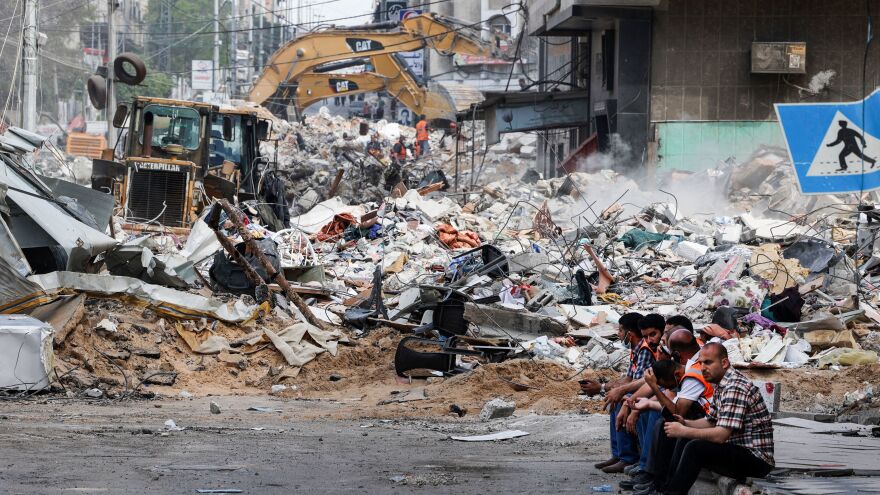Members of the United Nations Security Council met virtually Sunday to deliberate on the escalating violence between Israelis and Palestinians. Over the last past week, more than 180 Palestinians and 10 people in Israel have been killed.
Hamas militants have fired thousands of rockets into Israel while Israel has responded with airstrikes.
U.N. Secretary General António Guterres opened the meeting by expressing his concerns that if a cease-fire isn't reached soon, violence will continue and the situation will spiral out of control. He called the current hostilities "utterly appalling."
"This latest round of violence only perpetuates the cycles of death, destruction and despair. ... The fighting must stop, it must stop immediately," Guterres said. "The rockets and mortars on one side, aerial and artillery bombardments on the other, must stop. I appeal to all parties to hear this call. The United Nations is actively engaging all sides for an immediate cease-fire."
Weeks of sporadic violence intensified in East Jerusalem earlier this month following protests over evictions of Palestinian residents from properties Jewish settlers are claiming as their own. And on May 6, Israeli police in riot gear confronted crowds of Muslim worshippers at the Al-Aqsa Mosque.
In some cities inside Israel, Jewish and Palestinian mobs have attacked property and each another. Palestinian Arabs account for about 20% of Israel's population.

Nearly every country participating in Sunday's talks urged both sides to agree to a cease-fire. Representatives acknowledged Israel's right to defend itself and its citizens, while simultaneously saying that Israel is in a more powerful position in this particular conflict, and must act accordingly.
The Israel Defense Forces has conducted hundreds of precision attacks against alleged Hamas structures and fighters. However, some of those attacks have damaged or destroyed refugee camps, schools, hospitals and, as of Saturday, a high-rise building that was home to several media organizations including The Associated Press and Al-Jazeera.
Speaking on Face the Nation on Sunday, Israeli Prime Minister Benjamin Netanyahu said Sunday that Israel will "do whatever it takes to restore order and quiet and the security of our people and deterrence."
Netanyahu said Israel, like other countries, has a right to defend itself.
"We're trying to degrade Hamas' terrorist abilities and to degrade their will to do this again," he said. "So, it'll take some time. I hope it won't take long, but it's not immediate."
The prime minister said the attacks against Hamas, which the United States recognizes as a terrorist organization, are targeting rocket sites, weapons caches and fighters.
When asked what proof the IDF had that Hamas was using the building that also housed the offices of the AP and Al-Jazeera, Netanyahu said Israel had intelligence that Hamas had "an intelligence office ... that plots and organizes the terror attacks" from the building.

During the U.N. Security Council meeting, Palestinian Ambassador Riyad Mansour wondered how many Palestinian lives it would take for the international community to intervene. The conflict, he said, isn't between quarrelling neighbors; it's colonialism.
"There is no people on Earth that would tolerate this reality. Israel keeps saying, 'Put yourselves in our shoes,' but they aren't wearing shoes, they are wearing military boots," Mansour said. "Why not put yourself in our shoes? What would you do if your country was occupied? What would you do to achieve independence? How many Palestinians killed is enough for condemnation? We know one Israeli is enough, but how many Palestinians?"
Hamas combatants fired more rockets into Israel Sunday while Israeli airstrikes destroyed three buildings in Gaza and killed at least 42 people, marking the single deadliest day since the violence began a week ago.
U.N. Special Coordinator for the Middle East Peace Process Tor Wennesland said Sunday that at least 181 Palestinians, including 52 children, have been killed and 1,200 injured in airstrikes. At least 34,000 have been left homeless. In Israel, nine Israelis, including two children, and one Indian national were killed, and over 250 injured, he said.
Speaking to the U.N. Security Council, Israeli Ambassador Gilad Erdan echoed many of the prime minister's statements, saying Hamas is using civilians as human shields and that Israel has a right to defend itself.
"Israel has made its choice. We will take all steps necessary to defend our people," he told the U.N. "Now, you must make yours. The world is watching."
Copyright 2021 NPR. To see more, visit https://www.npr.org. 9(MDAxODc1ODA5MDEyMjg1MDYxNTFiZTgwZg004))


